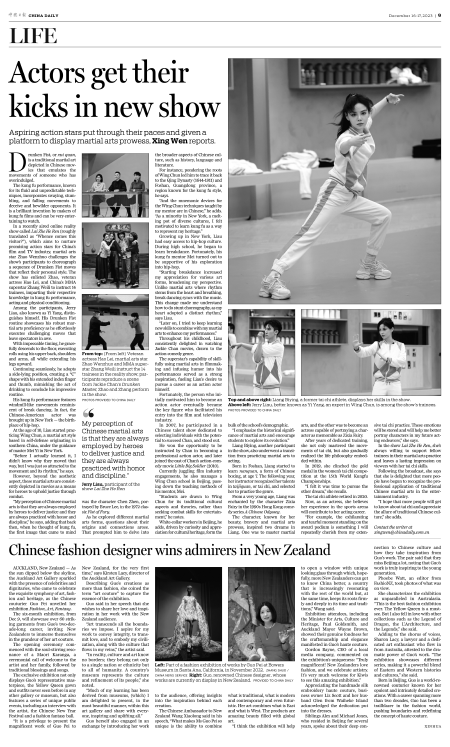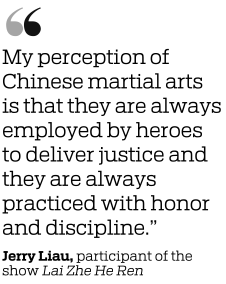

(From left) Veteran actress Hao Lei, martial arts star Zhao Wenzhuo and MMA superstar Zhang Weili instruct the 14 trainees in the reality show.
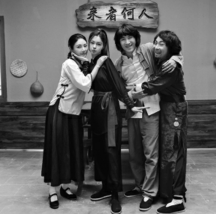
Participants reproduce a scene from Jackie Chan's Drunken Master.
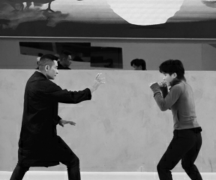
Zhao and Zhang perform in the show.
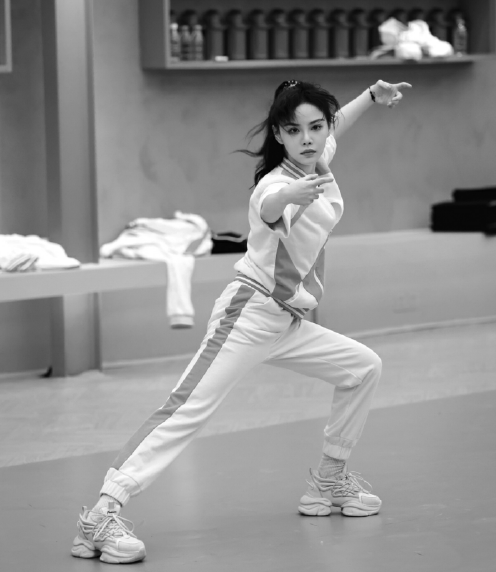
Liang Biying, a former tai chi athlete, displays her skills in the show.
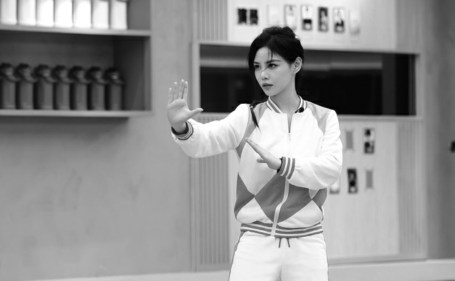
Liang Biying, a former tai chi athlete, displays her skills in the show.

Jerry Liau, better known as Yi Yang, an expert in Wing Chun, is among the show's trainees.
Drunken Fist, or zui quan, is a traditional martial art depicted in Chinese movies that emulates the movements of someone who has overindulged.
The kung fu performance, known for its fluid and unpredictable techniques, incorporates swaying, stumbling, and falling movements to deceive and bewilder opponents. It is a brilliant invention by makers of kung fu films and can be very entertaining to watch.
In a recently aired online reality show called Lai Zhe He Ren (roughly translated as "Whence comes this visitor?"), which aims to nurture promising action stars for China's film and TV industry, martial arts star Zhao Wenzhuo challenges the show's participants to choreograph a sequence of Drunken Fist moves that reflect their personal style. The show has enlisted Zhao, veteran actress Hao Lei, and China's MMA superstar Zhang Weili to instruct 14 trainees, imparting their respective knowledge in kung fu performance, acting and physical conditioning.
Among the participants, Jerry Liau, also known as Yi Yang, distinguishes himself. His Drunken Fist routine showcases his robust martial arts proficiency as he effortlessly executes challenging moves that leave spectators in awe.
With impeccable timing, he gracefully descends to the floor, executing rolls using his upper back, shoulders and arms, all while extending his legs upward.
Continuing seamlessly, he adopts a side-lying position, creating a "C" shape with his extended index finger and thumb, mimicking the act of drinking to conclude his impressive routine.
His kung fu performance features windmill-like movements reminiscent of break dancing. In fact, the Chinese-American actor was brought up in New York — the birthplace of hip-hop.
At the age of 10, Liau started practicing Wing Chun, a martial art style based in self-defense originating in southern China, under the guidance of master Mei Yi in New York.
"Before I actually learned it, I didn't know why they moved that way, but I was just so attracted to the movement and its rhythm," he says.
However, beyond the aesthetic aspect, these martial arts are consistently depicted in movies as a means for heroes to uphold justice through combat.
"My perception of Chinese martial arts is that they are always employed by heroes to deliver justice and they are always practiced with honor and discipline," he says, adding that back then, when he thought of kung fu, the first image that came to mind was the character Chen Zhen, portrayed by Bruce Lee, in the 1972 classic Fist of Fury.
As he explored different martial arts forms, questions about their origins and connections arose. That prompted him to delve into the broader aspects of Chinese culture, such as history, language and literature.
For instance, pondering the roots of Wing Chun led him to trace it back to the Qing Dynasty (1644-1911) and Foshan, Guangdong province, a region known for the kung fu style, he says.
"And the mnemonic devices for the Wing Chun techniques taught by my mentor are in Chinese," he adds. "As a minority in New York, a melting pot of diverse cultures, I felt motivated to learn kung fu as a way to represent my heritage."
Growing up in New York, Liau had easy access to hip-hop culture. During high school, he began to learn breakdance. Fortunately, his kung fu mentor Mei turned out to be supportive of his exploration into hip-hop.
"Starting breakdance increased my appreciation for various art forms, broadening my perspective. Unlike martial arts where rhythm stems from the heart and breathing, break dancing syncs with the music. This change made me understand how to do stunt choreography, as my heart adopted a distinct rhythm," says Liau.
"Later on, I tried to keep learning new skills to combine with my martial arts to enhance my performances."
Throughout his childhood, Liau consistently delighted in watching Jackie Chan movies, drawn to the action-comedy genre.
The superstar's capability of skillfully using martial arts in filmmaking and infusing humor into his performances served as a strong inspiration, fueling Liau's desire to pursue a career as an action actor himself.
Fortunately, the person who initially motivated him to become an action actor eventually became the key figure who facilitated his entry into the film and television industry.
In 2007, he participated in a Chinese talent show dedicated to selecting individuals with the potential to succeed Chan, and stood out.
He won the opportunity to be instructed by Chan in becoming a professional action actor, and later joined the cast of Chan's action-comedy movie Little Big Soldier (2010).
Currently juggling film industry engagements, he also manages a Wing Chun school in Beijing, passing down the teaching methods of his mentor, Mei.
"Students are drawn to Wing Chun for its traditional cultural aspects and theories, rather than seeking combat skills for entertainment," he notes.
White-collar workers in Beijing, he adds, driven by curiosity and appreciation for cultural heritage, form the bulk of the school's demographic.
"I emphasize the historical significance of martial arts and encourage students to explore its evolution."
Liang Biying, another participant in the show, also underwent a transition from practicing martial arts to acting.
Born in Foshan, Liang started to learn nanquan, a form of Chinese boxing, at age 7. The following year, her instructor recognized her talents in taijiquan, or tai chi, and selected her to practice the genre.
From a very young age, Liang was enchanted by the character Zixia Fairy in the 1990s Hong Kong comedy series A Chinese Odyssey.
The character, known for her beauty, bravery and martial arts prowess, inspired two dreams in Liang. One was to master martial arts, and the other was to become an actress capable of portraying a character as memorable as Zixia Fairy.
After years of dedicated training, she not only mastered the movements of tai chi, but also gradually realized the life philosophy embedded within.
In 2019, she clinched the gold medal in the women's tai chi competition at the 15th World Kungfu Championships.
"I felt it was time to pursue the other dream," she recalls.
The tai chi athlete retired in 2020.
Now, as an actress, she believes her experience in the sports arena will contribute to her acting career.
"For example, the exhilarating and tearful moment standing on the award podium is something I will repeatedly cherish from my extensive tai chi practice. These emotions will be stored and will help me better portray characters in my future acting endeavors," she says.
In the show Lai Zhe He Ren, she's always willing to support fellow trainees in their martial arts practice and leaves a lasting impression on viewers with her tai chi skills.
Following the broadcast, she says that she is delighted that more people have begun to recognize the professional application of traditional Chinese martial arts in the entertainment industry.
"I hope that more people will get to know about tai chi and appreciate the allure of traditional Chinese culture," she adds.
Contact the writer at xingwen@chinadaily.com.cn
